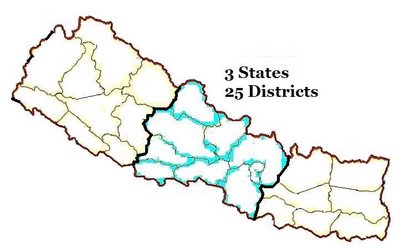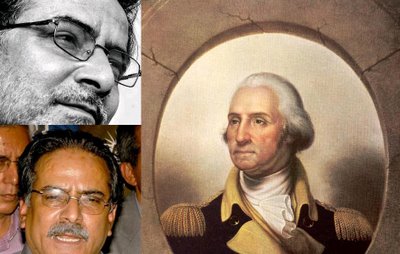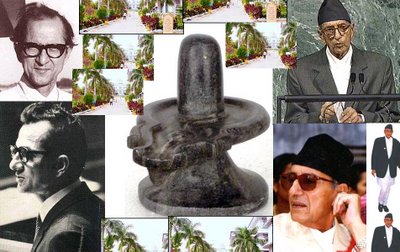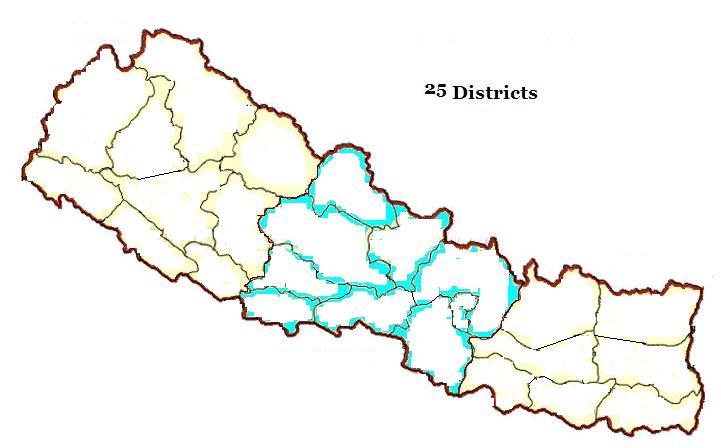
प्रस्तावना
- नेपाल एउटा संघीय गणतन्त्र हो, एउटा पूर्ण, पारदर्शी लोकतन्त्र हो, सार्वभौमसत्ता जनतामा िनिहत रहेको देश हो।
- एक राज्यको १०० गरी जम्मा ३०० सीट भएको प्रितिनिध सभा र १०० सीट भएको राज्य सभा हुनेछ। प्रत्येक प्रितिनिध सभा सीट लगभग बराबर जनसंख्याको आधारमा हुनेछ र िजल्ला सीमानालाई मान्ने छैन। संसदको म्याद ४ वर्ष हो। प्रितिनिध सभाको िनर्वाचनमा पाएको मतको आधारमा समानुपाितक िकिसमले पार्टीहरूले राज्य सभामा सीट पाउनेछन्। कम्तीमा १% मत पाउने पार्टी त्यसको हकदार हुनेछ।
- संसदको िक्रयाकलाप प्रत्यक्ष प्रसारण गर्ने अिधकार िमिडयालाई हुनेछ।
- दिलत, मधेशी, जनजाित र मिहलाले प्रितिनिध सभा र राज्य सभामा आरक्षण पाउनेछन्। ५, १०, ९ र १२%। आफ्नो जनसंख्याको २५%। मिहलाले दिलत, मधेशी, जनजाितले पाउनेको कम्तीमा आधा पाउनेछन् र थप, जम्माको ३३% पुग्ने गरी। मिहलाले पाउने ३३% मा कमसेकम २।३ दिलत, मधेशी, जनजाित हुनुपर्नेछ। मुसलमानले १ र नेवारले १ सीट पाउनेछन्। प्रितिनिध सभाकालािग आरिक्षत िनर्वाचन क्षेत्र हुनेछन्।
- अारक्षण पाएको कुनै समूहको संख्या संसदमा बढेर त्यस समूहको रािष्ट्रय जनसंख्याको समानुपाितक ७५% पुगेमा अारक्षण समाप्त हुनेछ। जम्मा सीटको ५०% भन्दा बढी अारक्िषत गर्न पाइने छैन। सेन्सस्का दौरान प्रत्येक व्यक्ितले अाफ्नो तीन सामूिहक पिहचान अंिगत गराउन पाउनेछ। पिहलो मिहला, पुरुष। त्यसपिछ प्रमुख सामूिहक पिहचान, जस्तो िक दिलत, मधेशी, जनजाित। तेस्रो अन्य। मिहलाले संसदमा ५०% सहभािगता नपाएसम्म ३३% अारक्षण कायम रहनेछ। त्यसपिछ प्रमुख सामूिहक पिहचानमा पर्ने समूहहरुले जुन समूहको राष्िट्रय जनसंख्याको रहेको भागको कमसेकम ४०% संसदमा छैन, त्यसले अारक्षण पाउनेछ।
- संसदले रािष्ट्रय स्तरका सबै सवालहरूमा बहुमतद्वारा िनर्णय गर्ने छ। संसद िनयमावलीकालािग ६०% मत चािहनेछ। नेपालले सही गर्ने अन्तर्रािष्िट्रय सिन्धहरु संसदले ६०% मतद्वारा पािरत गर्नुपर्नेछ।
- संसदले मतदान गर्ने प्रत्येक िबल नेपाली, िहन्दी र अंग्रेजीमा इन्टरनेटमा कमसेकम ७ िदन रािखनुपर्ने छ।
- संसद सेशनमा रहेको बेला गम्भीर अपराधकालािग बाहेक कुनै पिन सांसदलाई िगरफ्तार गर्न पाइने छैन। संसदमा बोिलएको कुनै पिन वचनमािथ कानून लाग्ने छैन।
- सभामुखलाई संसदमा मतको अिधकार हुने छैन। संसदको बैठक कमसेकम तीन मिहनामा एक पटक बस्नुपर्ने छ।
- राजनीितक पार्टीले िनजी क्षेत्रमा पैसा उठाउन वर्िजत गिरन्छ। रािष्ट्रय संसदीय चुनावमा कमसेकम १% मत ल्याउने पार्टी रािष्ट्रय पार्टी हो, र प्रत्येक रािष्ट्रय पार्टीले आफुले पाएको मतको आधारमा समानुपाितक िकिसमले राज्यबाट पैसा पाउनेछ।
- कुनै पिन पार्टीको कुनै पिन पदको िटकट कसले पाउने भन्ने कुराको िनर्णय त्यस पार्टीको सो वा सो स्तरभन्दा मुिनको सदस्यले लोकतािन्त्रक तिरकाले गर्नेछन्।
- प्रत्येक चुनावकालािग िनर्वाचन आयोगले बढीमा कित रकम खर्च गर्न पाउने भनेर तोक्ने छ। स्वतन्त्र उम्मेदवारले आफ्नै िनजी रकम मात्र खर्च ग्रन पाउने छन्। स्वतन्त्र उम्मेदवारले यिद चुनाव िजतेमा कमसेकम १ वर्ष कुनै रािष्ट्रय पार्टीको सदस्यता िलन पाउने छैनन्। कुनै पार्टीले सदस्यता शुल्क वर्षको बढीमा रू ६० राख्न पाउने छन्।
- सरकारी तलब खाने प्रत्येक व्यिक्तले आफ्नो पािरवािरक सम्पित्त िववरण वार्िषक िदन पर्ने छ।
- सरकारले खर्च गर्ने सबै रकमको अिनतम पैसा सम्मको िहसाब पारदर्शी राख्न पर्ने छ। राज्य र राष्ट्र स्तरका सम्पुरण संसदीय बहसहरू पारदर्शी रािखने छन्।
- देशको प्रत्येक िनर्वािचत पदािधकारीलाई तलबको व्यव्स्था हुनेछ।
- १८ वर्ष उमेर पुगेको प्रत्येक नागिरकलाई मतको अिधकार हुनेछ। प्रितिनिध सभा सदस्यको उमेर कम्तीमा २२ वर्ष र राज्य सभा सदस्यको उमेर कम्तीमा २५ वर्ष हुनुपर्नेछ।
- ६५% मतका आधारमा संसदले कुनै पिन सरकारी पदमा रहेको व्यिक्तलाई पदमुक्त गर्न सक्दछ। ६५% मतका आधारमा संसदले संिवधान संसोधन गर्न सक्दछ।
- संसदले वर्तमान सांसदको तलब बढाउन पाउने छैन।
- संसदलाई नया मन्त्रालय, एजेन्सी, किमशन गठन गर्ने, पुरानोलाई भंग गर्ने, मर्ज गर्ने अिधकार हुनेछ।
- राष्ट्रपितको प्रत्यक्ष िनर्वाचन हुनेछ र कार्यकाल पाँच वर्षको हुनेछ। कुनै पिन उम्मेदवारले कम्ती मा ५०% मत नल्याएमा दुइ जना सबैभन्दा बढी मत ल्याउने उम्मेदवार बीच एक मिहना िभत्र दोस्रो राउण्डको िनर्वाचन हुनेछ।
- राष्ट्रपितको उम्मेदवार हुन नागिरक हुनुपर्नेछ र उमेर कमसेकम ३० वर्ष हुनुपर्नेछ।
- राष्ट्रपितको एउटा मन्त्री पिरषद हुनेछ। त्यस मन्त्री पिरषदको सदस्य हुन सांसद हुनु पर्दैन। कोही सांसद मन्त्री पिरषदमा पुगेमा उक्त व्यिक्तको संसदीय सीट िरक्त हुनेछ।
- सर्वोच्च अदालतका न्यायिधश र िनर्वाचन आयोग, भ्रष्टाचार िनवारण आयोग र केन्द्रीय बैंक जस्ता संवैधािनक रूपले स्वायत्त िनकायका किमशनर र गवर्नरको िनयुिक्त राष्ट्रपितले गर्नेछन्। त्यसरी िनयुक्त व्यिक्तले संसदमा ६०% मत पाउनु पर्नेछ। त्यस्ता किमशनर र गवर्नरको पदाविध ६ वर्षको हुनेछ।
- नेपाल सेनाको संख्या देशको जनसंख्याको ०.१% भन्दा बढी हुनेछैन। यो संिवधान लागु भएको ५ वर्ष िभत्रमा त्यसरी संख्या घटाइनुपर्नेछ। राष्ट्रपित नेपाल सेनाका कमाण्डर इन िचफ हुन्। संसदले ६५% मतका अाधारमा नेपाल सेनालाई िवघटन गर्न सक्छ।
- अाफ्नो िनजी कार्यालय, सल्लाहकार अािद बाहेक राष्ट्रपितले िनयुक्त गर्ने प्रत्येक व्यिक्तलाई अन्यथा िकटान नगिरएको अवस्थामा संसदको बहुमत चािहनेछ।
- वार्िषक बजेट राष्ट्रपितले पेश गर्ने छन् तर संसदले पािरत गर्न पर्नेछ।
- संसदले पठाउने िबल राष्ट्रपितले सही गरेपिछ त्यो कार्यान्वयन हुनेछ। संसदमा राष्ट्रपितले पिन िबल पठाउन सक्छन्।
- संसदले पठाएको िबल राष्ट्रपितले िफर्ता पठाइिदन सक्छन्। तर त्यही िबल संसदले ६५% मतले पािरत गरेमा त्यो िबल राष्ट्रपितले सही गर्नै पर्नेछ।
- संसदले पठाएको िबल राष्ट्रपितले १० िदन िभत्रमा सही नगरेमा वा वापस संसदलाई िफर्ता नपठाएमा त्यो स्वत: पािरत भएको मािननेछ।
- प्रत्येक राज्यले त्यसरी नै एउटा गवर्नर िनर्वािचत गर्नेछ।
- गाउँ।शहर, िजल्ला, राज्य, केन्द्र गरेर प्रत्येक तहमा न्यायपािलकाको उपिस्थित रहनेछ। ठुलो जनसंख्या रहेका गाउँ।शहर र िजल्लामा त्यसै अनुसारको ठुलो उपिस्िथित रहनेछ। िजल्ला र राज्य बीच एउटा अर्को लेयर रहनेछ, प्रत्येक राज्यमा ५ वटा कोर्ट अफ अिपल्स। गाउँ।शहर र िजल्ला स्तरमा दक्ष स्थानीय व्यिक्तलाई रािखनु पर्नेछ। स्थानीयको पिरभाषा राज्य सरकारले गर्नेछ।
- न्यायपािलकालाई दुरुस्त प्रशासनयन्त्रको रुपमा िवकास गिरनेछ।
- सर्वोच्च न्यायालयका न्यायाधीशहरूले ६५ वर्षको उमेरसम्म सेवा गर्नेछन्। सोभन्दा अगािड स्वेच्छाले अवकाश प्राप्त गर्न सक्नेछन्।
- राज्य र केन्द्रका सर्वोच्च न्यायालयहरुलाई राज्य र केन्द्रका संसदहरुले पािरत गरेका कानूनको वैधािनकता बारे बहस र िनर्णय गर्ने अिधकार हुनेछ। तर अवैधािनक घोिषत भएका कानूनलाई संसदले ६५% मतले फेिर पािरत गरेमा त्यसको वैधािनकता कायम हुनेछ।
- संसदले कुनै न्यायाधीशको तलब घटाउन पाउने छैन।
- कोशी, गण्डकी, कर्णाली गरी तीन राज्य हुनेछन्। देशलाई २५ िजल्लामा बाँिडनेछ। प्रत्येक राज्यमा २०० सीट भएको प्रितिनिध सभा र ५० सीट भएको राज्य सभा हुनेछ। केन्द्रीय स्तरको एक क्षेत्रलाई राज्य स्तरमा दुईमा बाँिडनेछ।
- गाउँ।शहर र िजल्ला स्तरका सरकारहरुको िनर्वाचन प्रिक्रया, बनौट अािद बारे प्रत्येक राज्यको संसदले छुट्टा छुट्टै िनर्णय गर्नेछन्।
- केन्द्र स्तरको बजेटको ५% १० वटा प्रित व्तक्ित सबैभन्दा कम अाय भएका िजल्लाहरूलाई जनसंख्याका अाधारमा समनुपाितक िकिसमले हस्तान्तरण गिरनेछ।
- इन्कम ट्याक्स यस प्रकार बाँिडनेछ: ५०% केन्द्र, ३०% राज्य, १०% िजल्ला, र १०% गाउँ।शहर। तर इन्कम ट्याक्स कलेक्शन केन्द्रले मात्र गर्नेछ।
- इन्कम ट्याक्सबाट बाहेक अन्य स्रोतबाट अाएको अायबाट बनेको बजेट पिन केन्द्रले ५०% राखी बाँकी तीन राज्यलाई जनसंख्याका अाधारमा समनुपाितक िकिसमले हस्तान्तरण गर्नेछ। राज्यले ५०% राखी बाँकी िजल्लालाई जनसंख्याका अाधारमा समनुपाितक िकिसमले हस्तान्तरण गर्नेछ। िजल्लाले ५०% राखी बाँकी गाउँ।शहरलाई जनसंख्याका अाधारमा समनुपाितक िकिसमले हस्तान्तरण गर्नेछ।
- १० कक्षासम्म िनजी, सरकारी, स्वायत्त एवं अन्य िवद्यालयमा त्रीभाषीय िशक्षा लागू हुनेछ। १० कक्षापिछ कुन भाषामा पठनपाठन हुने कुरा प्रत्येक िशक्षण संस्थानले अाफै िनर्णय गर्नेछ। प्रत्येक िवद्यार्थीको एउटा प्रथम भाषा हुनेछ। दोस्रो भाषा नेपाली हुनेछ। नेपाली नै प्रथम भाषा भएकाले नेपालमा बोिलने कुनै पिन भाषालाई अाफ्नो दोस्रो भाषा बनाउन सक्नेछन्। तेस्रो भाषा अंग्रेजी। ५ कक्षापिछ गिणत र िवग्यान अंग्रेजीमा पढाइनेछ। अरू िवषय कुन भाषामा पढाउने भन्ने िनर्णय गर्ने अिधकार िजल्ला सरकारको िशक्षा सिमितलाई हुनेछ। िनजी क्षेत्रका िवद्यालयले त्यो िनर्णय अाफैं गर्नेछन्।
- गाउँ।शहर र िजल्ला स्तरका सरकारहरुको कामकाज नेपाली बाहेक अरू पिन भाषामा हुने िनर्णय िजल्ला सरकारले गर्न सक्नेछ।
- व्यिक्त राज्यको सबैभन्दा महत्वपूर्ण अंग हो। मानव अिधकारको घोषणापत्र यस संिवधानको आधारिशला हो।
- प्रत्येक व्यिक्तलाई वाक स्वतन्त्रता, शािन्तपूर्ण रूपले भेला हुने स्वतन्त्रता, धर्मको स्वतन्त्रता हुनेछ। प्रत्येक व्यिक्तलाई स्पीिड, पब्िलक ट्रायलको र प्राइभसीको अिधकार छ। एउटै अपराधकालािग दुई पटक मुद्दा चलाउन पाइने छैन। कसैले अाफै िवरूद्ध साक्षी बस्नुपर्ने छैन। कानुनी प्रिक्रयाद्वारा बाहेक कसैलाई स्वतन्त्रता र सम्पित्तबाट वंिचत गिरने छैन। िनजी सम्पित्त पब्िलक कामकालािग कम्पेनशेसन निदइ जफत गर्न पाइने छैन। अित ठूलो बेल अथवा जिरवाना लगाइने छैन। क्रुर सजाय िदइने छैन। रीट अफ हेिबयस कोर्पस सस्पेण्ड गिरने छैन। िवगतका काम कारवाही समेट्ने गरी कानून पािरत गिरने छैन। िबना स्पष्ट कारण वारण्ट जारी गिरने छैन। जारी गिरएको वारण्टमा कुन ठाउँ खोजतलाशी गर्ने, कुन व्यक्ित समात्ने, के सम्पित्त जफत गर्ने कुरा स्पष्ट हुनु पर्नेछ। अपराधको दोष लागेको व्यक्ितले अिनवार्य रूपले अाफ्नो पक्षमा साक्षी खडा गर्न पाउने व्यवस्था हुन पर्नेछ, र कानूनी सेवाको अिधकार हुनेछ।
- नेपालमा जन्मेको प्रत्येक व्यिक्त नेपाली नागिरक हो। तर नेपालमा नजन्मेको व्यक्ितलाई पिन नागिरक बनाउने प्रावधान रािखनेछ।
- कानूनका दृष्िटले प्रत्येक व्यिक्त बराबर हो।
- कुनै पिन व्यिक्तले अाफ्नो अायको ४०% भन्दा बढी अाय कर ितर्न पर्ने छैन। अाम्दानीका िहसाबले तल्लो ४०% जनसंख्याले अाय कर ितर्नेे छैनन्।
- कुनै पिन िबजनेसले अाफ्नो मुनाफाको ३०% भन्दा बढी अाय कर ितर्न पर्ने छैन। तल्लो ३०% िबजनेसले अाय कर ितर्नेे छैनन्। िबजनेस संचालन र िवस्तारमा लाग्ने खर्चमा कर लाग्ने छैन।
- सेल्स ट्याक्स १०% भन्दा बढी हुने छैन, र राज्यद्वारा मात्र उसूल गिरनेछ।
- कुनै पिन स्तरको िनर्वाचन शिनवार मात्र अायोजना गिरने छ।
- जेलमा रहेका बाहेक कुनै पिन नागिरकलाई मतािधकारबाट विञ्चत गराइने छैन।
- अाजीवन िशक्षा लक्ष्य हो।
- प्रत्येक िशक्षण संस्थाले अाफ्नो १०% िवद्यार्थीलाई पूर्ण छात्रवृित प्रदान गरेको हुनुपर्नेछ। ५% पूर्ण छात्रवृित र १०% अर्द्ध छात्रवृित पिन प्रदान गर्न सक्नेछ। ५% पूर्ण छात्रवृित, ६% अर्द्ध छात्रवृित र ६% एक ितहाइ छात्रवृित पिन प्रदान गर्न सक्नेछ।
- िशक्षा र स्वास्थ्य क्षेत्रका उही तहका सरकारी करमचारीलाई अरु क्षेत्रकालाई भन्दा १०% बढी तलब िदइनेछ।
- सबैलाई िनशुल्क प्राथिमक स्वास्थ्य र १० कक्षासम्म िशक्षा उपलब्ध गराइनेछ। माइक्रो क्रेिडट उपलब्ध गराइनेछ।
- २०,००० रुप्याभन्दा बढीको पैसा लोन िदने काममा लागेको प्रत्येक व्यक्ितले िबजनेसको रुपमा रेिजस्टर गरेको हुनुपर्नेछ। ती िबजनेस रेगुलेट गिरनेछन्।
- कमसेकम १० वर्षमा एक पटक सेन्सस् गिरनेछ।
- १० वर्ष िभत्रमा देशको राजधानी सारेर काठमाण्डुबाट िचतवन पुर्याइनेछ। कोशी, गण्डकी, कर्णालीको राजधानी उदयपुर, िचतवन र सुर्खेत हुनेछ।
Interim Constitution, Revolutionary Parliament (April 8)
Proposed Republican Constitution 2006 (January 1)
Proposed Constitution (December 19)
Proposed Constitution (November 17)
Proposed Constitution (September 3)
Proposed Democratic Republican Constitution (August 12)
Janata Dal Constitution (August 8)
Proposed Constitution (June 18)
Reorganized UN, Proposed Constitution, Methods (May 30)
Proposed Constitution (May 3)
Shortcut To A New Constitution, Shortcut To Peace (April 8)
This Inadequate, Improper, Insufficient 1990 Constitution (April 4)



